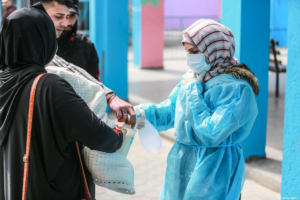Palestinians, curfews and self-discipline

A healthcare worker gives hand sanitizer to people in Gaza City, 18 March 2020
Lama Khater writes in Middle East Monitor:
I do not think that there is any Palestinian in the West Bank and Gaza Strip who has not had experience of curfews in their years of living under the Zionist occupation, especially those old enough to remember the First Intifada (1987-1993). The most volatile areas in terms of confrontations and clashes were under strict curfews for extended periods and suffered major food shortages. Breaks lasted just a few days before the curfew was reimposed, usually after renewed clashes or operations against the occupation army.
The curfew policy allowed Israel to be its normal violent self as searches across neighbourhoods and inside homes were made easier in the absence of people on the streets. Curfews were also used by the Israeli authorities as a punitive measure; they hoped that they would act as a deterrent in areas where protests were organised against the occupation or where an operation targeting security forces was carried out. The punishment for breaking the curfew included arrest, beatings, abuse and, occasionally, being fired upon by the occupation forces.
In those days, the Palestinians looked for ways to sidestep the curfew; groups specialised in monitoring the main routes into their city, village, camp and neighbourhood. They provided cover for other groups to move around, carry out emergency work and check on and assist vulnerable families and individuals. Challenging and breaking the curfew demonstrated the will, determination and defiance of the people, as well as their refusal to give up. There were even those who left their homes to confront the occupation soldiers despite the curfew.
This inherited popular culture in relation to curfew policy is still alive in the minds of many Palestinians who felt that to abide by the curfew was to submit to the oppression of the occupation. This was even the case when the curfew was imposed by Palestinian themselves in order to protect the people, not punish or humiliate them.
In these days of the coronavirus pandemic, I would not be exaggerating if I said that there are many Palestinian areas within which orders to stay at home are not being obeyed, especially in the West Bank, where such directives have been in place for over a week. Some people see no harm in going about their normal daily activities. This includes visiting friends and family, as long as it is out of sight of the security forces, who could fine them for leaving their homes for non-essential reasons.
While it is uncommon for a Palestinian institution to impose a policy on the people which is also used by the Israelis in the context of their occupation, today the situation is completely different. This is a global measure, not a local issue. There is a difference between refusing to obey a punitive curfew imposed by the occupation authorities and a curfew imposed by the Palestinian Authority in order to reduce the risk to our health and the health of those around us. We need to understand this.
